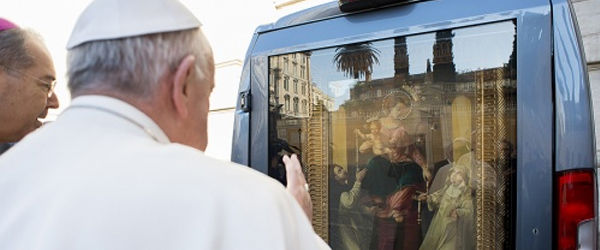The first time I saw a movie at the Egyptian Theatre was in October 1961. Oddly enough, I arrived at the same theater to see the same film on the final day of the 7th annual TCM Film Festival.
In 1961, Christ the King parish school in Hollywood had arranged for students to see “King of Kings” during its initial run there. We discovered that this film placed the Legion of Decency in something of a quandary.
For decades, following a strict application of Catholic faith and morality, the Legion had branded films “AI: For general audiences,” “AII: For adults and adolescents” and “AIII: For adults only.” Despite all its lapses in theology and history, a cinematic life of Christ could hardly be labeled “objectionable” or “condemned.” So the Legion invented a new classification: “AIV: Adults with reservations.” Problem solved.
Sister Rose Pacatte, having spent a month on TCM introducing films which had been condemned by the Legion, alluded to the problem raised by “King of Kings” while introducing the film for festival goers.
One story I know about the film was told by Jack Paar, the host of “The Tonight Show” before Johnny Carson. He and his family were in Spain and were invited by Samuel Bronston, the film’s producer, to watch the Sermon on the Mount sequence.
Three-thousand Spanish extras swarmed along the side of a hill when Jeffrey Hunter, playing Jesus, appeared at the summit. Seeing Hunter, the extras were filled with spiritual enthusiasm. With the cameras running they bowed and knelt, making sign of the cross since Hunter looked every inch the Jesus of holy cards.
Bronston was enthusiastic, “Look at this spontaneous devotion,” he cried. “It’s perfect!” Well, not quite perfect.
After printing the film and sending it Stateside, Bronston was informed that much of the film had to be reshot. The sign of the cross, he was told, came about only after Jesus had been crucified.
In 1961, we 7th graders were unimpressed with the extra-biblical touches provided by screen writer Philip Yordan: Pilate providing Jesus with a defense attorney; and, for some reason, the inscription on the cross reading INRI, as if those initials were as well-known in AD 33 as NATO was 1928 years later. Remaining impressive 55 years later is the comprehensive nature of the Sermon on the Mount, Robert Ryan’s powerful performance as John the Baptist and composer Milks Rozsa’s grand yet perceptive musical score.
Appreciation for Rozsa and the art of scoring music for films led me to the next special presentation at the Roosevelt. Thomas Golubiƒá, himself a film composer with a program on local station KCRW-89.9 FM, explained the intricacies of matching music to film. He showed how a portion of a score might sound right but, after the film has been completed, the sequence might have to be scrapped because it doesn’t fit the tone of rest of the picture. It was an insightful experience.
Next, the still lovely international actress Gina Lollobrigida spoke about her career. She told how, when first starting out, she was ready to be romanced by Errol Flynn for the film “Crossed Swords” (1954). They began the scene but Flynn became ill and wasn’t seen on the set for a month.
Miss Lollobrigida did not care for director King Vidor when she appeared in his final film, “Solomon and Sheba.” She had nothing but warm memories of Yul Brynner, who took over the role of Solomon at the last minute after Tyrone Power died before the film was completed.
More enjoyable than all her film roles, said Lollobrigida, has been her sculpting and working as a photojournalist, especially when she made headlines in the 1970s when she interviewed Fidel Castro.
Come the late afternoon and I betook myself back to the Chinese Multiplex to watch one of my favorite films for the first time in a theater, a restored version of “The Keys of the Kingdom” (1944), based on the superlative novel by Scottish Catholic convert, A.J. Cronin.
As a young Scotsman in the late 1800s, whose parents die for being “dirty papists,” Francis Chisholm (Gregory Peck) becomes a priest but has difficulty with various pastors. Still, his bishop (Edmund Gwenn) has great faith in him and asks him to go to China as a missionary.
Father Chisholm proclaims Christ to the heathen, encountering hardship and trials, even from the arrogant Mother Maria Veronica (Rose Stradner), superior of the nuns sent to assist him, and childhood friend, the worldly Msgr. Angus Mealey (Vincent Price).
In only his second film role Gregory Peck earned his first Oscar nomination.
Cecilia Peck, Gregory’s daughter, introduced the film and I had a chance to speak to her for a few moments afterward. We recalled how channel 9, then KHJ-TV, used to show “Keys of the Kingdom” in the 1960s, and we both regretted that the movie is not better known.
There are a great many films regarding saints and sinners shown on TCM. Parents have a sterling opportunity to sit down with their children and enjoy such films as “The Keys of the Kingdom,” “The Song of Bernadette,” “The Passion of Joan of Arc” and “A Tree Grows in Brooklyn.” These movies are well-made and have survived the years to reflect a still-valid Catholic view of life around us.
Sean M. Wright is an Emmy-nominated television writer and author. He presents workshops and Catholic faith formation courses at parishes throughout the archdiocese.

